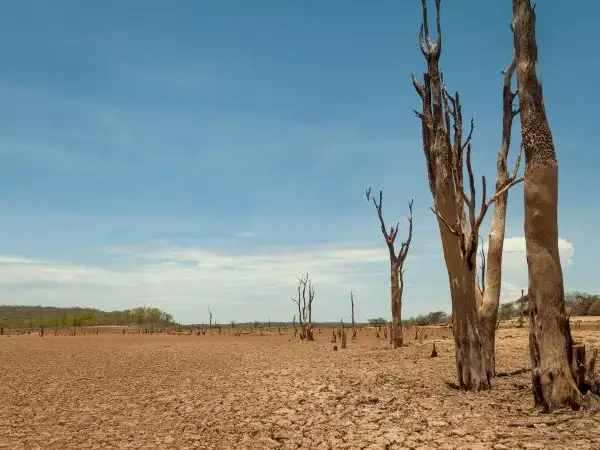


A parched landscape in Zimbabwe's Binga district. Photo credit: Charmaine Chitate
This study, funded by CAFOD through a grant to ODI, addresses a pressing concern: how does international action funded by developed countries contribute to the global goal of adapting to climate change?
The report focuses on the UK’s International Climate Finance (ICF) and examines whether ICF actions are supporting the Global Goal on Adaptation (GGA) of the Paris Agreement. The UK is one of the world’s leading providers of climate finance, with a commitment to an even split in support for mitigation and adaptation. Scrutiny of this commitment is therefore important as the UK prepares to host the COP26 meeting in Glasgow.
Key messages
The UK is one of the world’s leading providers of climate finance and the co-host of the 2021 UNFCCC climate negotiations (COP26), which means that its approach to reporting on climate finance is particularly important.
Public reporting on climate change adaptation by the UK’s ICF is not commensurate with the level of funding being committed.
The extent to which the ICF portfolio is contributing to the Global Goal on Adaptation (GGA) cannot be independently assessed at the present time.
The Development Tracker web portal is deficient as a public reporting tool for programme-level information that would demonstrate ICF’s contribution to the GGA.
A longstanding emphasis on the value-for-money metric appears to have come at a cost of far less attention being given to the metrics of equity, subsidiarity, equitable participation, ‘do no harm’, and environmental sustainability in ICF climate investments.
Key recommendations
Public reporting and knowledge management need significant and immediate improvement for ICF funded programmes. The UK government should undertake a rapid review of how the ICF currently reports, and should then develop a strategy for improved visibility of its funded actions for climate change adaptation.
The proposed framework developed in this paper for reporting on actions that aim to support the global goal on adaptation should be considered for both programme and portfolio reporting of ICF investments. This framework would complement the established value-for-money metric.
The ICF KPI framework should be subject to external evaluation to determine whether it is fit for purpose in terms of the function it is intended to fulfil. This paper’s assessment is that the present KPIs cannot be used to assess the UK’s contribution to the GGA.
A separate web portal to the Development Tracker portal should be created for the ICF, with each funded programme fully documented. This would make the wealth of knowledge gained through the considerable analytical work financed by the ICF readily accessible for lesson learning and public scrutiny. With internet access improving globally, such a portal would help strengthen accountability to the direct beneficiaries of ICF investments.
The ICF should learn from the reporting norms of the global climate funds, where the UK has been a longstanding major player (e.g. the Green Climate Fund). For example, in terms of the reporting process, the GCF has a specific mechanism for civil society observers to follow Board decision-making, whereas the ICF does not.
CAFOD policy and advocacy
Policy and research
CAFOD's policy team provides briefings, reports and research on our advocacy and lobbying work, plus materials to support our campaigns.
UK support for energy overseas
Our latest research using an updated methodology analyses UK support for energy overseas in the period 2010–11 to 2017–18.
CDC support for fossil fuels
Research into CDC’s energy investments overseas shows that it is investing hundreds of millions of pounds in fossil fuels.




